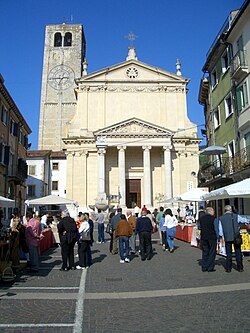This article needs additional citations for verification. (July 2018) |
Negrar di Valpolicella is a comune (municipality) in the Province of Verona in the Italian region Veneto, about 110 kilometres (68 mi) west of Venice and about 12 kilometres (7 mi) northwest of Verona. Since 8 February 2019, the official name has been changed to "Negrar di Valpolicella" (L.R. n. 7, 8 February 2019) after a referendum was held in the town.[3]
Negrar di Valpolicella | |
|---|---|
| Comune di Negrar di Valpolicella | |
 | |
 | |
| Coordinates: 45°32′N 10°56′E / 45.533°N 10.933°E | |
| Country | Italy |
| Region | Veneto |
| Province | Verona (VR) |
| Frazioni | Arbizzano, Jago, Fane, Mazzano, Montecchio, Prun, Santa Maria, Torbe |
| Government | |
| • Mayor | Fausto Rossignioli |
| Area | |
• Total | 40.5 km2 (15.6 sq mi) |
| Elevation | 190 m (620 ft) |
| Population (2015)[2] | |
• Total | 17,119 |
| • Density | 420/km2 (1,100/sq mi) |
| Time zone | UTC+1 (CET) |
| • Summer (DST) | UTC+2 (CEST) |
| Postal code | 37024 capoluogo, 37020 frazioni |
| Dialing code | 045 |
| Patron saint | Saint Martin |
| Website | Official website |
History
editIn prehistoric times, it was a center of the Arusnati, a not-well-known population of perhaps mixed origins. In the Middle Ages it was a free commune until it was acquired by the Scaliger of Verona (14th century). Later it was part of the Republic of Venice, under which, in 1791, it received the right to hold a livestock market. In 2020 the municipality announced that a Roman villa had been discovered beneath a local vineyard.[4]
Archaeology
editIn May 2020, the discovery of a well-preserved Roman mosaic floor dating to the 3rd century AD buried underneath a vineyard is reported after about a century of searching the site of a long-lost villa.[5][6][7][8]
Economy
editNegrar and its villages are mainly devoted to agriculture, with production of cherries, vine and fruit, and of wines such as Valpolicella, Amarone and Recioto.
Notable people
edit- Andrea Benvenuti, athlete
- Pietro Boselli, engineer, former mathematician and model
- Davide Formolo, cyclist
- Matteo Manassero, professional golfer
- Damiano Tommasi, ex professional footballer, mayor of Verona
- Ronnie Quintarelli, racing driver.
Gallery
edit-
Panorama
-
vineyards
-
vineyards
-
Villa Mosconi Bertani and Amarone vineyards
-
Villa Rizzardi and Amarone vineyards
References
edit- ^ "Superficie di Comuni Province e Regioni italiane al 9 ottobre 2011". Italian National Institute of Statistics. Retrieved 16 March 2019.
- ^ All demographics and other statistics: Italian statistical institute Istat.
- ^ "Risultati ufficiosi Referendum Consultivo Cambio Denominazione". www.comunenegrar.it (in Italian). Retrieved 2019-04-13.
- ^ "Roman mosaic floor found under Italian vineyard". BBC News. BBC. 2020-05-27. Retrieved 2020-05-27.
- ^ Rob Picheta. "Perfectly preserved ancient Roman mosaic floor discovered in Italy". CNN. Retrieved 2020-09-08.
- ^ "Ancient Roman mosaic floor discovered under vines in Italy". the Guardian. 2020-05-27. Retrieved 2020-09-08.
- ^ "Roman mosaic floor found under Italian vineyard". BBC News. 2020-05-27. Retrieved 2020-09-08.
- ^ "Perfectly preserved ancient Roman mosaic floor unearthed beneath Italian vineyard". www.cbsnews.com. Retrieved 2020-09-08.
External links
edit



